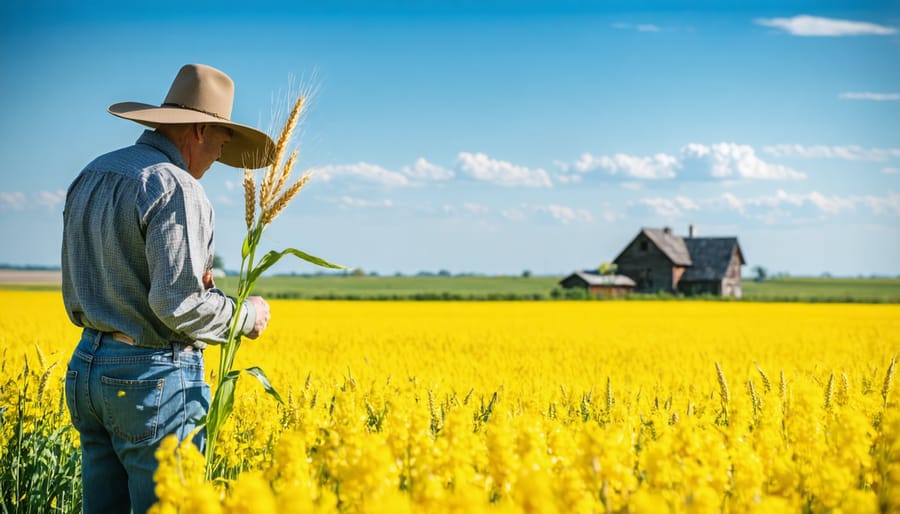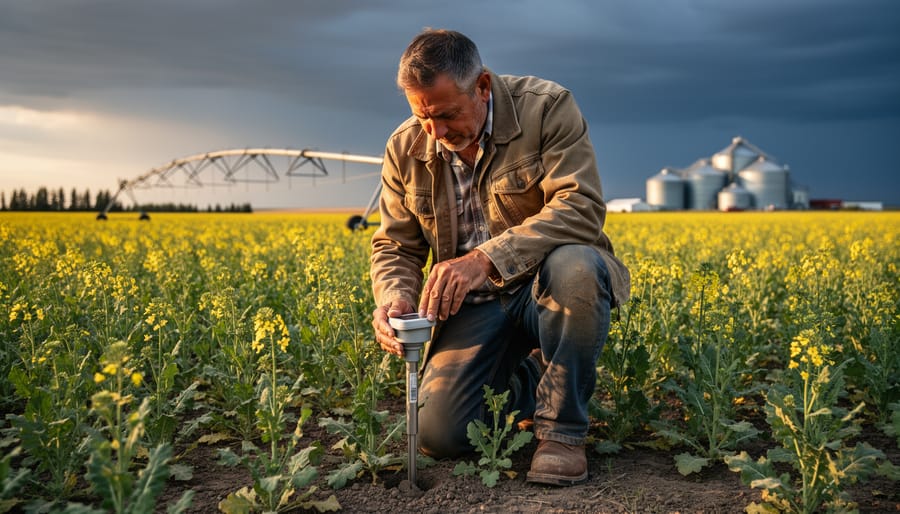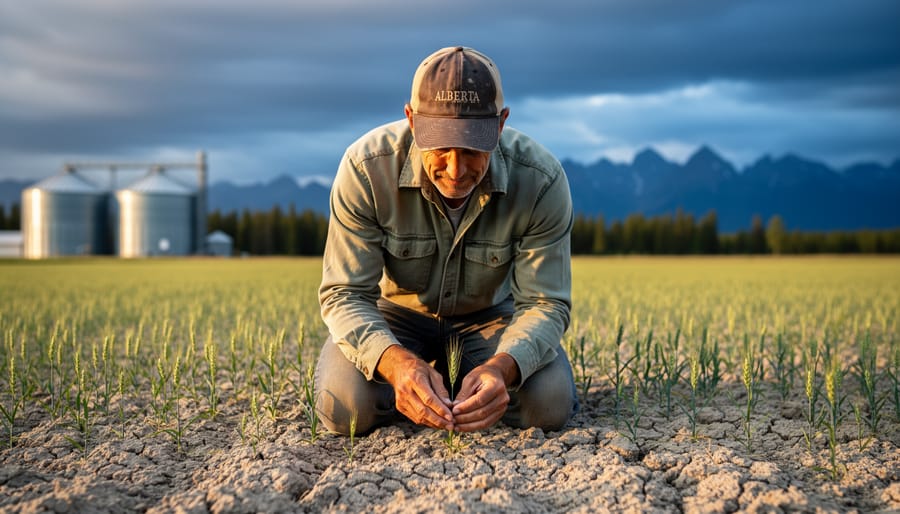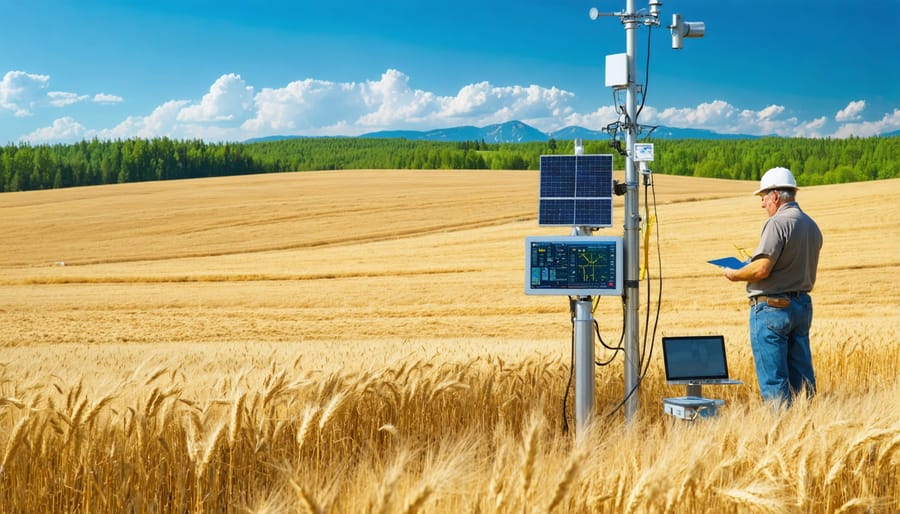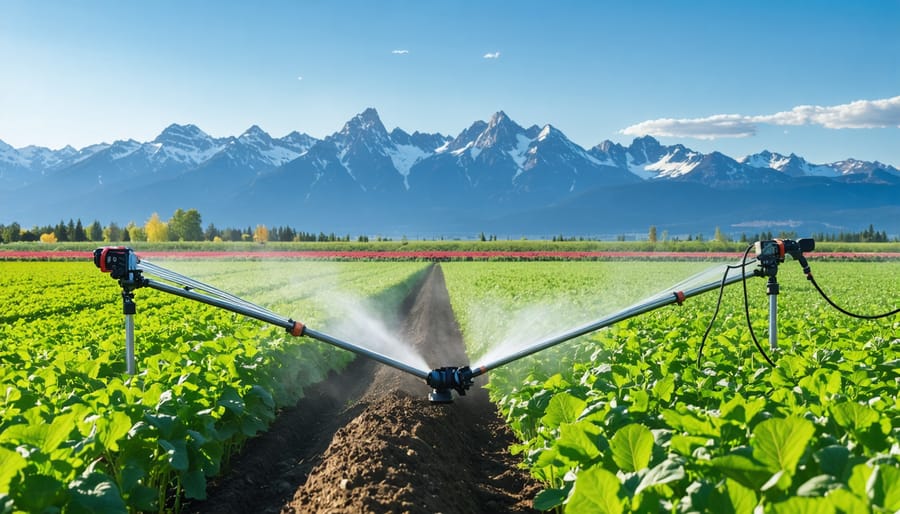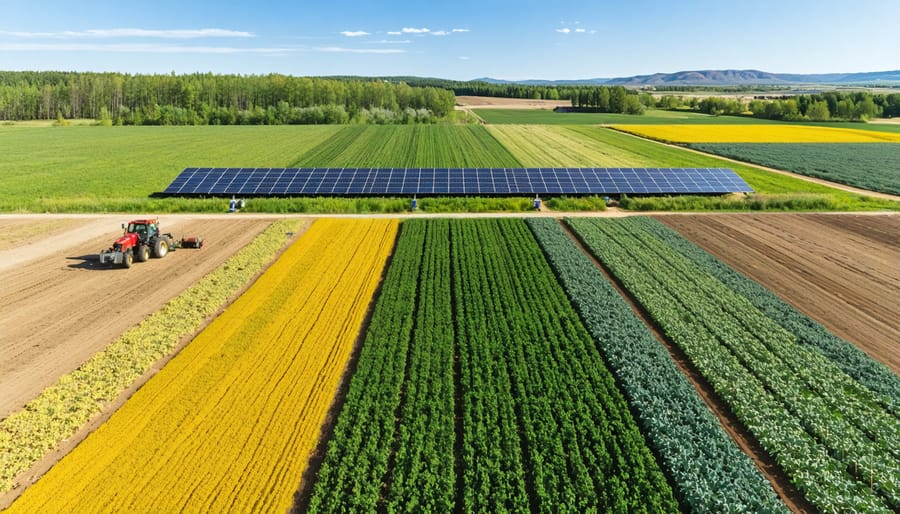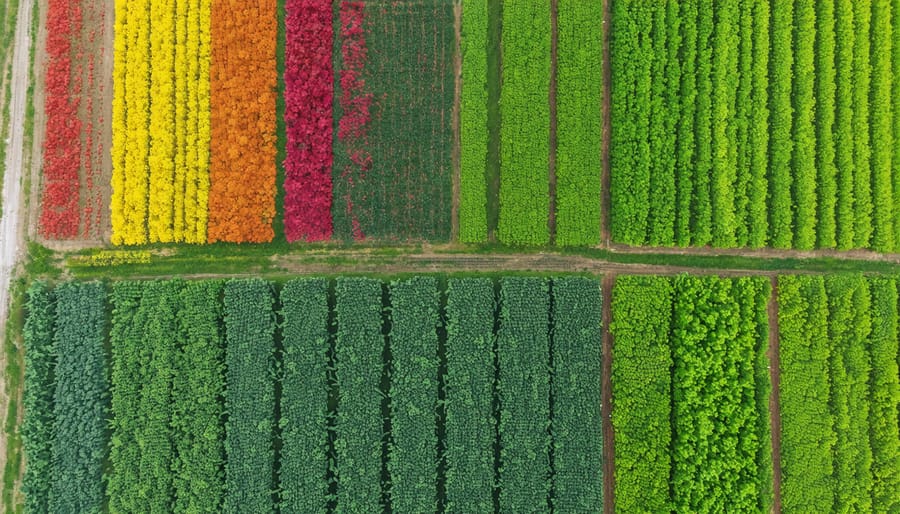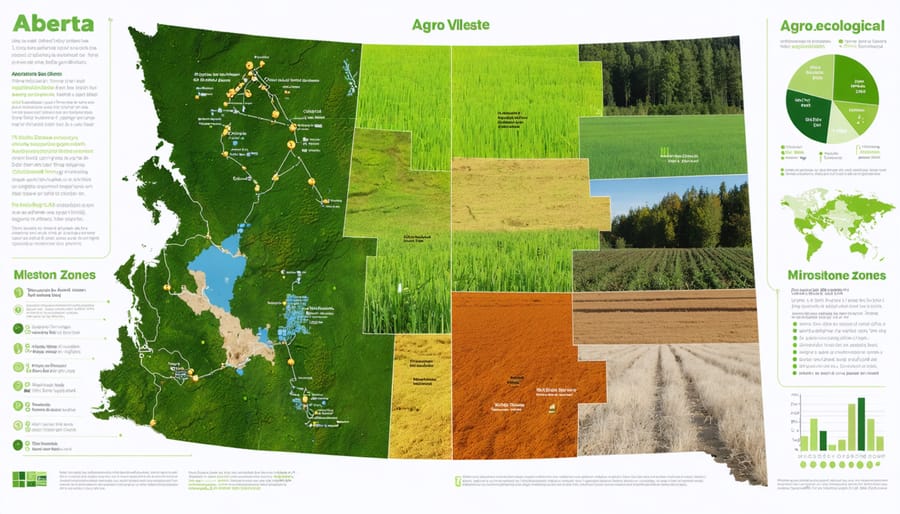Climate-resistant crops stand as Alberta farmers’ strongest defense against increasingly unpredictable weather patterns and current agricultural challenges. Recent field trials across the province demonstrate that drought-tolerant wheat varieties increase yields by 30% during moisture-stressed seasons, while heat-resistant canola strains maintain oil content even when temperatures exceed 30°C. Prairie farmers pioneering these adaptive varieties report consistent harvests despite extreme weather events, marking a significant shift in regional agricultural resilience.
Through strategic crop selection and advanced breeding programs, Alberta’s agricultural sector is developing robust solutions that protect farm incomes while strengthening food security. These innovations combine traditional farming wisdom with cutting-edge genetics, creating crops that not only survive but thrive in our evolving climate. For producers seeking sustainable solutions, climate-resistant varieties offer a practical path forward, backed by local research and proven results in Prairie conditions.
Alberta’s Changing Climate: Why Traditional Crops Are Struggling
Temperature Fluctuations and Moisture Stress
Alberta’s agricultural regions face increasingly unpredictable temperature patterns, with extreme fluctuations becoming more common throughout the growing season. Our farmers regularly experience spring frost events followed by sudden heat waves, which can severely impact crop development and yields. These temperature swings, particularly during critical growth stages, can reduce crop vigor and stress plant defenses.
Moisture stress presents another significant challenge, with many areas experiencing longer dry periods punctuated by intense rainfall events. The southern prairies, traditionally drier, are seeing more pronounced drought conditions, while central regions face sporadic moisture distribution patterns. This variability affects soil moisture retention and can lead to both drought and waterlogging situations within the same growing season.
According to local agricultural extension services, these patterns have led to an average 15-20% yield variation in conventional crops across different regions of Alberta. However, many farmers are successfully adapting by implementing moisture conservation techniques and selecting varieties bred specifically for temperature resilience. The key is understanding your local microclimate and choosing crops that can withstand both temperature extremes and irregular moisture patterns.
Economic Impact on Farm Operations
Climate vulnerabilities pose significant financial challenges for Canadian farm operations, with extreme weather events potentially reducing crop yields by 20-40% in severe cases. For Alberta farmers, these impacts translate into real economic pressures, including increased irrigation costs, higher insurance premiums, and unpredictable harvest outcomes.
Recent studies from Agriculture Canada show that farms implementing climate-resistant crops typically see a 15-25% reduction in weather-related losses compared to those using conventional varieties. This improved resilience helps stabilize annual income and provides better long-term financial planning opportunities.
The investment in climate-resistant varieties often pays for itself within 2-3 growing seasons through reduced input costs and more consistent yields. While initial seed costs may be 10-15% higher, the reduced need for supplemental irrigation and fewer crop protection products often results in net savings of $75-150 per hectare annually.
Many Alberta farmers report that diversifying their crop portfolio with climate-resistant varieties has helped them maintain profitability during challenging weather years, creating a more sustainable business model for future generations.
Top-Performing Climate-Resistant Crops for Alberta
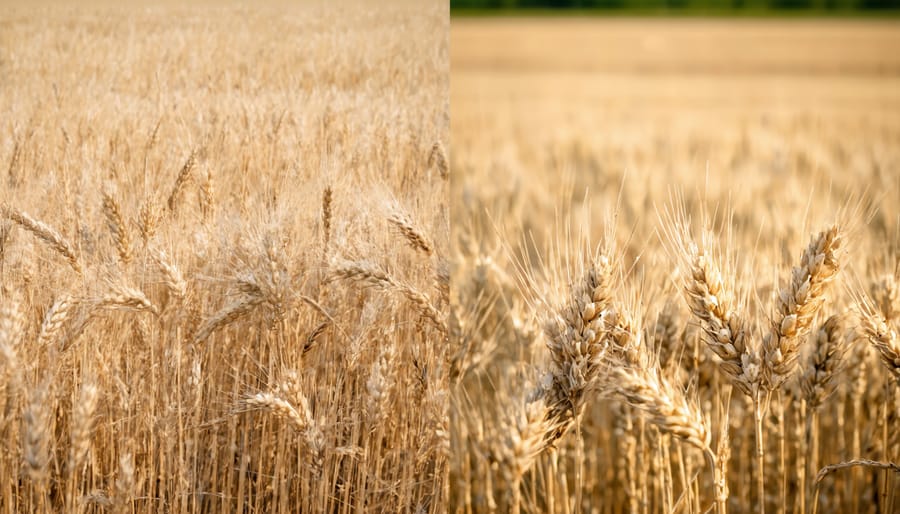
Drought-Tolerant Wheat Varieties
Recent field trials across Alberta have demonstrated remarkable success with new drought-tolerant wheat varieties, offering hope for farmers facing increasingly unpredictable rainfall patterns. The AAC Paramount variety, developed specifically for Prairie conditions, has shown yields up to 15% higher than traditional varieties during drought conditions while maintaining protein content above 13%.
Local farmer Sarah Thompson from Lethbridge County reported outstanding results with AAC Paramount during the challenging 2022 growing season. “Despite receiving only 60% of our usual rainfall, we harvested 3.2 tonnes per hectare, which exceeded our expectations,” she shares. This success story exemplifies how adopting climate-smart farming practices can enhance farm resilience.
The CDC Credence variety has also demonstrated impressive drought tolerance, with field tests showing a 20% reduction in water requirements compared to conventional varieties. Its deep root system, reaching up to 2 meters, enables better moisture utilization from deeper soil layers.
Performance data from the Alberta Wheat Commission’s variety trials indicates these new wheat varieties maintain quality standards even under water stress, with test weights consistently meeting Grade 1 specifications. When combined with appropriate soil management techniques, these varieties offer Prairie farmers a viable strategy for adapting to changing climate conditions while maintaining productive yields.
Heat-Resistant Canola Options
Recent developments in canola breeding have yielded promising new varieties specifically engineered to withstand Alberta’s increasingly warm summers. Through collaborative efforts between Canadian researchers and local seed companies, farmers now have access to heat-tolerant canola options that maintain yield stability even when temperatures climb above 30°C.
The newest heat-resistant varieties, such as HT-145 and CS-3000, have demonstrated up to 15% better yield retention during heat stress compared to traditional varieties. These cultivars feature enhanced root systems that improve water uptake and modified leaf structures that reduce moisture loss during hot spells.
Dr. Sarah Thompson, a plant breeder at the Canola Research Centre in Lacombe, notes: “We’re seeing these new varieties perform exceptionally well in field trials across southern Alberta, where summer temperatures regularly challenge crop development. The enhanced heat tolerance doesn’t come at the expense of other desirable traits like disease resistance or oil content.”
Local success stories are emerging, with Lethbridge-area farmer Mike Peterson reporting consistent yields despite last season’s record temperatures: “The new heat-tolerant canola held up remarkably well when our traditional varieties struggled. It’s giving us more confidence in our crop planning, especially with these unpredictable weather patterns.”
These varieties are now widely available through local seed suppliers, with early booking typically recommended to ensure availability for the coming growing season.
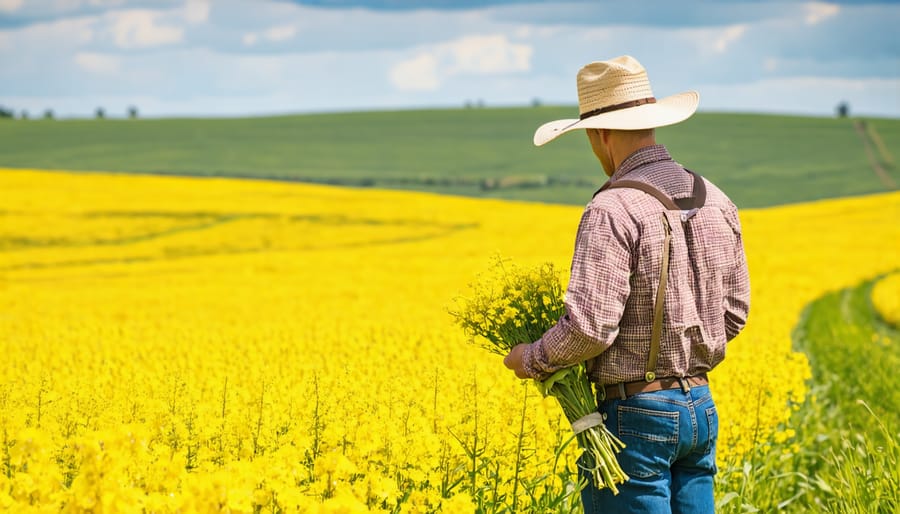
Cold-Hardy Pulse Crops
Pulse crops have emerged as resilient options for Alberta farmers facing unpredictable frost patterns. Field peas and faba beans, in particular, demonstrate remarkable cold tolerance, with some varieties capable of withstanding temperatures as low as -4°C during early growth stages.
The CDC Meadow field pea, developed at the University of Saskatchewan’s Crop Development Centre, has shown exceptional frost hardiness in Alberta field trials. Farmers in the Peace Region have successfully seeded this variety in early April, taking advantage of its ability to germinate in soil temperatures as low as 4°C.
Faba beans are another standout performer, with varieties like Snowbird and Snowdrop showing particular promise. These varieties can be planted when soil temperatures reach 3°C and have demonstrated survival through late spring frosts. Their deep root systems also help them recover more effectively from frost damage compared to other pulse crops.
Lentils, while traditionally considered frost-sensitive, have seen improvements through breeding programs. The small red lentil variety CDC Maxim CL has proven particularly resilient in central Alberta, where unexpected frost events are common. When planted at the recommended 4-6 cm depth, these lentils show improved frost tolerance during emergence.
For best results, pulse crops should be inoculated with appropriate rhizobia before planting, as cold soils can slow natural nitrogen fixation. Seed treatments can also provide additional protection during cold emergence conditions.
Implementation Success Stories
Southern Alberta Farm Case Study
The Henderson family farm, located 30 kilometers south of Lethbridge, has become a shining example of sustainable farming success through their innovative approach to climate-resistant crops. In 2019, after experiencing three consecutive years of drought-related crop losses, Tom and Sarah Henderson decided to revolutionize their 800-hectare operation.
They transitioned 40% of their land to drought-resistant wheat varieties and introduced intercropping with chickpeas, which naturally enhance soil nitrogen levels. The results were remarkable: despite receiving 30% less rainfall than the regional average in 2021, their wheat yields remained stable at 3.2 tonnes per hectare, while neighboring farms experienced significant decreases.
The Hendersons also implemented strip-cropping techniques and incorporated native prairie grasses as wind barriers. These practices reduced soil erosion by 60% and decreased irrigation needs by 25%. Their success has inspired fifteen other local farms to adopt similar strategies.
“The key was selecting crops that could handle our changing climate while maintaining productivity,” explains Tom Henderson. “We’re not just surviving; we’re thriving.” The farm now hosts regular field days, sharing their experiences with other Alberta farmers and contributing to the growing knowledge base of climate-adaptive agriculture in the region.
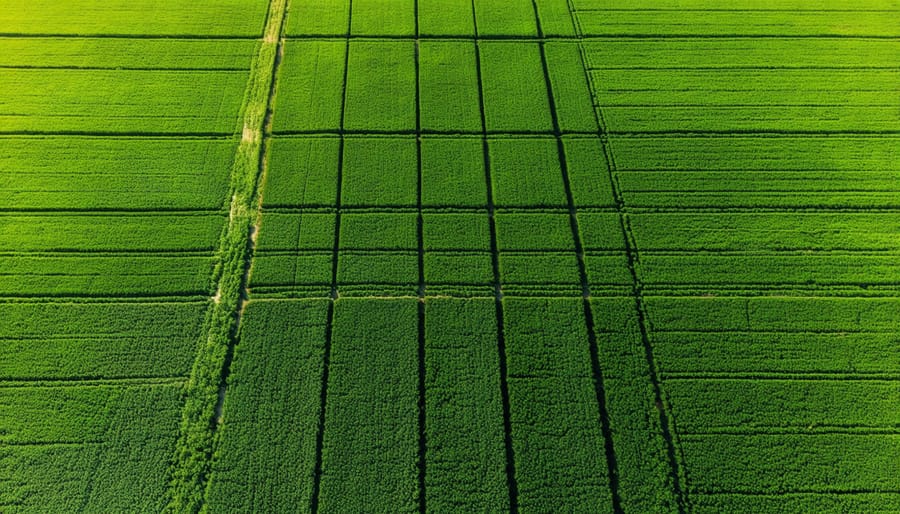
Central Alberta Mixed Operation Results
The Hansen family farm, located 30 kilometers east of Red Deer, has successfully implemented a climate-resistant cropping system that demonstrates the potential of diversified farming in Central Alberta. Over the past five years, their 2,000-hectare operation has shown remarkable resilience through varying weather conditions.
By integrating drought-tolerant wheat varieties, frost-resistant barley, and hardy pulse crops like faba beans and field peas, the Hansens have maintained consistent yields despite experiencing both drought and excessive moisture. Their wheat yields averaged 4.2 tonnes per hectare in 2022, only 10% below their historical average, despite receiving 40% less rainfall than normal.
The operation’s success stems from their strategic crop rotation system and adoption of moisture conservation practices. By incorporating cover crops and maintaining crop residue, they’ve improved soil organic matter by 2% across their fields, enhancing water retention capacity.
Farm manager Sarah Hansen notes, “We’ve seen our soil health improve dramatically since implementing these changes. The diversity in our crop selection has made our operation more resilient to weather extremes, and we’re actually seeing more consistent profit margins year over year.”
The operation also reported a 15% reduction in input costs through reduced irrigation needs and better nutrient cycling, demonstrating that climate-resistant farming can be both environmentally and economically sustainable.
Getting Started with Climate-Resistant Varieties
Selection and Testing Process
Selecting climate-resistant crops requires a systematic approach that combines traditional knowledge with modern agricultural innovations. Start by consulting local seed suppliers and agricultural extension offices to identify varieties that have shown promise in Alberta’s diverse growing conditions. Consider conducting small-scale trials on your farm, testing 2-3 new varieties alongside your current crops.
Document key performance indicators throughout the growing season, including germination rates, drought tolerance, and yield data. Pay special attention to how crops respond during extreme weather events. Many Alberta farmers find success with split-field trials, where they plant half with a traditional variety and half with a climate-resistant variety for direct comparison.
Connect with neighbouring farms participating in variety trials to share experiences and data. The Prairie Regional Variety Testing Program offers valuable insights into crop performance across different regions. Remember to assess not just yield, but also factors like disease resistance, market demand, and storage qualities when making your final selections.
Available Support Programs
Several support programs are available to help Alberta farmers transition to climate-resistant crops. Agriculture and Agri-Food Canada offers the AgriInnovate program, which provides funding for implementing new agricultural technologies and practices. The Canadian Agricultural Partnership (CAP) in Alberta supports farmers with grants of up to $50,000 for sustainable farming initiatives, including drought-resistant crop adoption.
Local agricultural societies and producer groups across Alberta provide valuable mentorship programs, connecting experienced farmers who have successfully transitioned to climate-resistant crops with those looking to make the change. The Alberta Climate Smart Agriculture Portal offers free resources, including soil testing services and climate monitoring tools.
For Indigenous farmers, the First Nations Agriculture Training Program provides specialized support and funding for sustainable farming practices. Additionally, many agricultural co-operatives throughout the province offer seed-sharing programs and collective purchasing opportunities to help reduce the initial costs of transitioning to new crop varieties.
Regional agricultural fieldmen and extension specialists are available through Alberta Agriculture and Forestry to provide one-on-one consulting services and technical support throughout the growing season.
As we’ve explored throughout this article, climate-resistant crops are not just an option but a necessity for Alberta’s agricultural future. By adopting varieties like drought-tolerant wheat, cold-hardy pulses, and weather-resistant canola, farmers across our province are already proving that adaptation is possible and profitable.
The success stories from fellow Alberta farmers demonstrate that transitioning to climate-resistant crops doesn’t require a complete overhaul of existing operations. Rather, it’s about making smart, incremental changes that build resilience over time. The research coming out of our local agricultural institutions continues to provide new options and strategies tailored to our unique growing conditions.
Remember, you’re not alone in this journey. Our robust agricultural community, including local extension services and farmer cooperatives, stands ready to support your transition to more resilient farming practices. Start small by experimenting with climate-resistant varieties on a portion of your land, carefully document your results, and share your experiences with other farmers in your area.
The time to act is now. With changing weather patterns affecting our growing seasons, implementing climate-resistant crops isn’t just about protecting your harvest – it’s about securing the future of Alberta’s agricultural heritage. Take that first step today by connecting with local seed suppliers and agricultural experts to discuss which climate-resistant varieties might work best for your operation.
Together, we can build a more resilient and sustainable agricultural future for Alberta.

